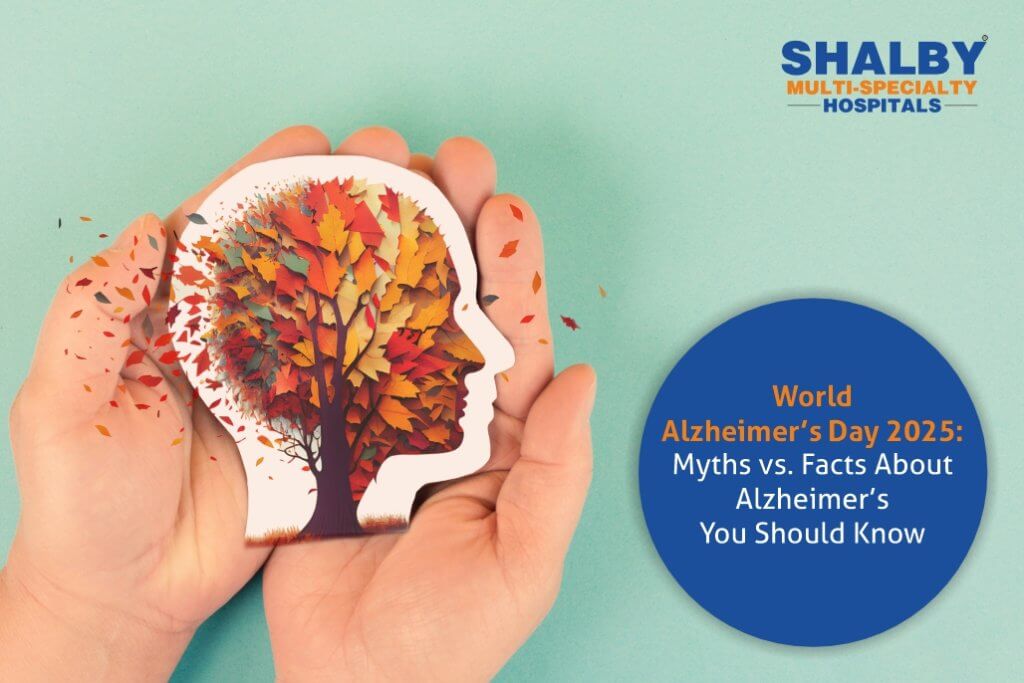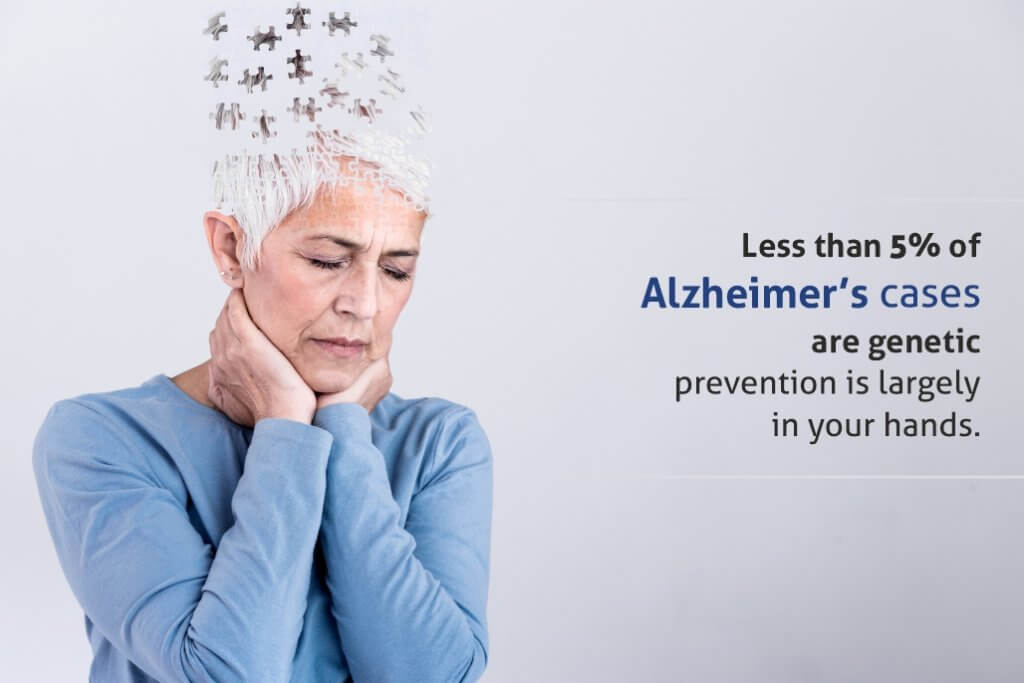
World Alzheimer’s Day, observed every September 21, shines a spotlight on one of the most challenging brain disorders of our time. Alzheimer’s disease affects millions worldwide, altering memory, thinking skills, and behavior. On this important day, it is vital to dispel common misconceptions and replace them with accurate information. Whether you are a patient, a caregiver, or simply curious, understanding the myths vs. facts about Alzheimer’s can guide early detection, treatment, and support. As the Best Neurology Hospital in India, Shalby Hospital in Ahmedabad is committed to raising awareness and providing world-class care.
Alzheimer’s disease is a progressive neurodegenerative disorder that represents the most common form of dementia, accounting for 60-70% of all dementia cases globally. Unlike normal age-related forgetfulness, Alzheimer’s involves distinct brain changes, including the buildup of abnormal protein deposits called amyloid plaques and tau tangles. The disease gradually impairs memory, thinking, and behavior, eventually affecting the ability to perform even simple daily tasks. Currently, over 55 million people worldwide live with dementia, with this number expected to rise significantly as populations age. In the United States alone, more than 7 million Americans are living with Alzheimer’s disease, making it a critical public health challenge.
Myth 1: Memory Loss Is a Normal Part of Aging
Fact: While occasional forgetfulness can occur with age, persistent memory loss is not normal. Alzheimer’s disease involves progressive and severe decline in memory and other cognitive abilities. Early warning signs include difficulty performing familiar tasks, misplacing items frequently, and getting lost on familiar routes. Recognizing these symptoms promptly is crucial.
Fact: Although Alzheimer’s most commonly develops in people over 65, early-onset Alzheimer’s can occur in individuals in their 40s or 50s. Anyone experiencing worrying cognitive changes should seek evaluation from a specialist.
Fact: While there is currently no cure for Alzheimer’s, treatments can help manage symptoms and improve quality of life. Medications such as cholinesterase inhibitors and NMDA receptor antagonists can temporarily reduce cognitive decline. In addition, non-drug therapies—cognitive stimulation, physical exercise, and social interaction—play a key role. Shalby Hospital, recognized as the Best Hospital for Brain Health in Ahmedabad, provides medication management, physical therapy, and nutrition counseling. Support groups for patients and caregivers improve emotional well-being and coping skills.
Fact: Alzheimer’s impacts more than just memory. The disease can impair language skills, problem-solving, judgment, and behavior. People may struggle to find words, make decisions, or manage finances. In advanced stages, daily activities like dressing, eating, and bathing become challenging. Early intervention at a centre recognized as the Best Hospital for Brain Health in Ahmedabad ensures a multidisciplinary team addresses cognitive, emotional, and physical needs.

Fact: Familial Alzheimer’s accounts for less than 5% of cases. Most individuals develop Alzheimer’s due to a complex mix of genetic, lifestyle, and environmental factors. Genes such as APOE ε4 increase risk but do not guarantee disease. Healthy habits—balanced diet, regular exercise, mental stimulation, and social engagement—can help lower risk.
Fact: Excessive alcohol consumption and smoking increase the risk of Alzheimer’s and other dementias. Alcohol damages brain cells and disrupts communication pathways, while smoking accelerates vascular damage, reducing blood flow to the brain. Quitting cigarettes and moderating alcohol intake are powerful steps toward preserving cognitive health. Shalby Hospital’s neurology team supports patients in making lifestyle changes and offers resources for smoking cessation programs.
Fact: Puzzles, crosswords, and strategy games do stimulate thinking, but cannot by themselves prevent Alzheimer’s. A comprehensive approach—combining mental exercises with physical activity, healthy eating, quality sleep, stress management, and social connection—is far more protective. Shalby Hospital’s holistic brain health programs include tailored cognitive training alongside yoga, meditation, and nutrition workshops to maintain mental agility.
Fact: Alzheimer’s progression varies widely. Some individuals experience a slow decline over many years, while others progress more rapidly. Factors such as age of onset, overall health, and timely access to care influence the course. At Shalby Hospital, our specialists monitor each patient’s unique trajectory and adjust treatment plans accordingly. This personalized strategy has earned us recognition as the Best Neurology Hospital in India.
Early diagnosis of Alzheimer’s opens the door to effective management. It allows patients and families to plan for the future, join clinical trials, and access support networks. At Shalby Hospital, advanced diagnostics—MRI, PET scans, and cerebrospinal fluid analysis—enable precise identification of Alzheimer’s and other neurodegenerative disorders. As a leading Alzheimer’s Treatment Hospital in India, we prioritize early intervention to maximize benefits from available therapies.
As one of the Best Neurology Hospitals in India, Shalby Hospital is committed to advanced care for Alzheimer’s disease and other neurological conditions. With a team of highly trained neurologists, modern diagnostic tools, and personalized treatment plans, we ensure holistic patient care. If you are looking for the Top Neurologist for Alzheimer’s Disease or an Alzheimer’s Treatment Hospital in India, Shalby Hospital is a trusted name. Patients from across the country and abroad choose us for our expertise in neurology and brain health.
Our hospital in Ahmedabad is regarded as the Best Hospital for Brain Health in Ahmedabad because of our focus on innovative treatments, compassionate care, and strong patient support.
Conclusion
On World Alzheimer’s Day 2025, let us break the myths and embrace the facts about Alzheimer’s disease. By spreading awareness, encouraging early diagnosis, and supporting research, we can help patients and families live better lives. If you or your loved one is experiencing symptoms of memory loss or confusion, do not ignore them. Consult a neurologist at Shalby Hospital, where expert care and hope come together for better brain health. Book Your Consultation Today!
Few things sound scarier to most people than the idea of a “brain-eating amoeba.” This terrifying infection is caused by a tiny organism called Naegleria fowleri. Even though it sounds like something from a horror movie, it is a real but rare...
World Alzheimer’s Day, observed every September 21, shines a spotlight on one of the most challenging brain disorders of our time. Alzheimer’s disease affects millions worldwide, altering memory, thinking skills, and behavior. On this important day, it is vital to dispel common...
Neurological disorders are complex and require specialized care from skilled professionals who understand the intricate workings of the nervous system. When it comes to getting top-quality neurological care in Ahmedabad, Shalby Hospital stands out as a trusted name. With advanced facilities, expert...